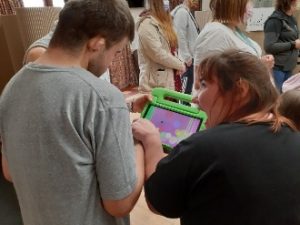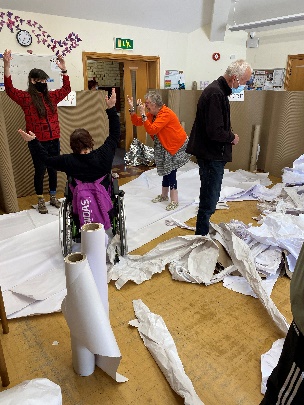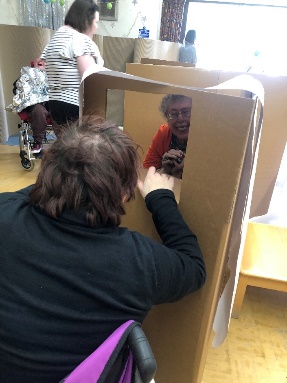An account shared by Prof Melanie Nind.
This summer I had the pleasure of joining forces with two arts practitioners, a local self-advocacy group and two Dorset day centres in a project funded by the Public Engagement in Research unit at University of Southampton. This project explored the potential of arts-based activities for facilitating friendships and belonging for people with profound and multiple learning disabilities. We were interested in fostering and better understanding belonging within self-advocacy and belonging in research – both being areas of activity where people with the most profound disabilities have been left out in the cold.
The CRI-allied arts practitioners, Dr Jill Goodwin (installation artist) and Dr Asha Ward (digital music specialist), provided three arts-based workshops. These were designed to be a vehicle for fostering participation, sense of belonging and self-expression – to bring people into contact within an immersive space built together with arts materials. Our partners, People First Dorset, were at each workshop and reflected with us after each one on what we were learning. We focused on how to evaluate the action and what could be put into practice in the future. We used Photographs to log what happened and to provoke reflections. Everyone’s way of knowing (verbal or sensory) was valued equally and a photo story of the project was created. It was a great way of keeping alive our SPIRIT (Southampton Platform for Inclusive Research and Ideas Together) partnership.
People with profound and multiple learning disabilities are often the excluded of the excluded, and not knowing how to meaningfully engage with them is a barrier to their involvement in self-advocacy; their isolation was exacerbated by the Covid-19 pandemic. While our aspiration was to bring people out of day centres into community-based venues, Covid meant we needed to work in the day centre environment taking the arts-based workshops to the people!
The initial idea was to use the workshops to create democratic spaces where everyone could belong whether or not they used spoken/symbolic language, where anyone could lead, where there was no right or wrong. The day centre space was transformed into an unfamiliar space thereby stimulating curiosity. Altering the room to have corrugated cardboard wavy walls, cardboard booths and peepholes, open spaces and massive rolls of paper created a different feel to the now monochrome space: calm and inviting.
Some explored readily and playfully, others more slowly and warily, while some were clearly uncomfortable just ‘being’ in the space and sought to bring familiarity to it by doing normal things.
Reflections showed very different perspectives on what had worked well and why. One self-advocate partner focused on what people liked and didn’t like; another reflected on the communication challenges and what worked well and less well. Gathering the images and reflections together on Padlet in a timeline became a powerful resource for sharing our thinking and seeing people’s responses unfolding. Listening to feedback, the workshops became more structured.
Pleasure/enjoyment became a major feature of everyone’s reflections. It was very unsettling when the research team could not tell whether someone was enjoying a sensation or activity. Moments of enjoyment were noticed and celebrated, particularly shared enjoyment and finding pleasure in doing things together. The photo record was good for highlighting these moments. It was the enjoyment that gave a sense of purpose to the workshops and generating enjoyment took over somewhat from other aims. There were conflicting pulls to give everyone a good time and rehearse activities and approaches that People First Dorset would be able to use in the longer term, which was not always the same as exploring the potential of arts-based approaches for fostering belonging.



